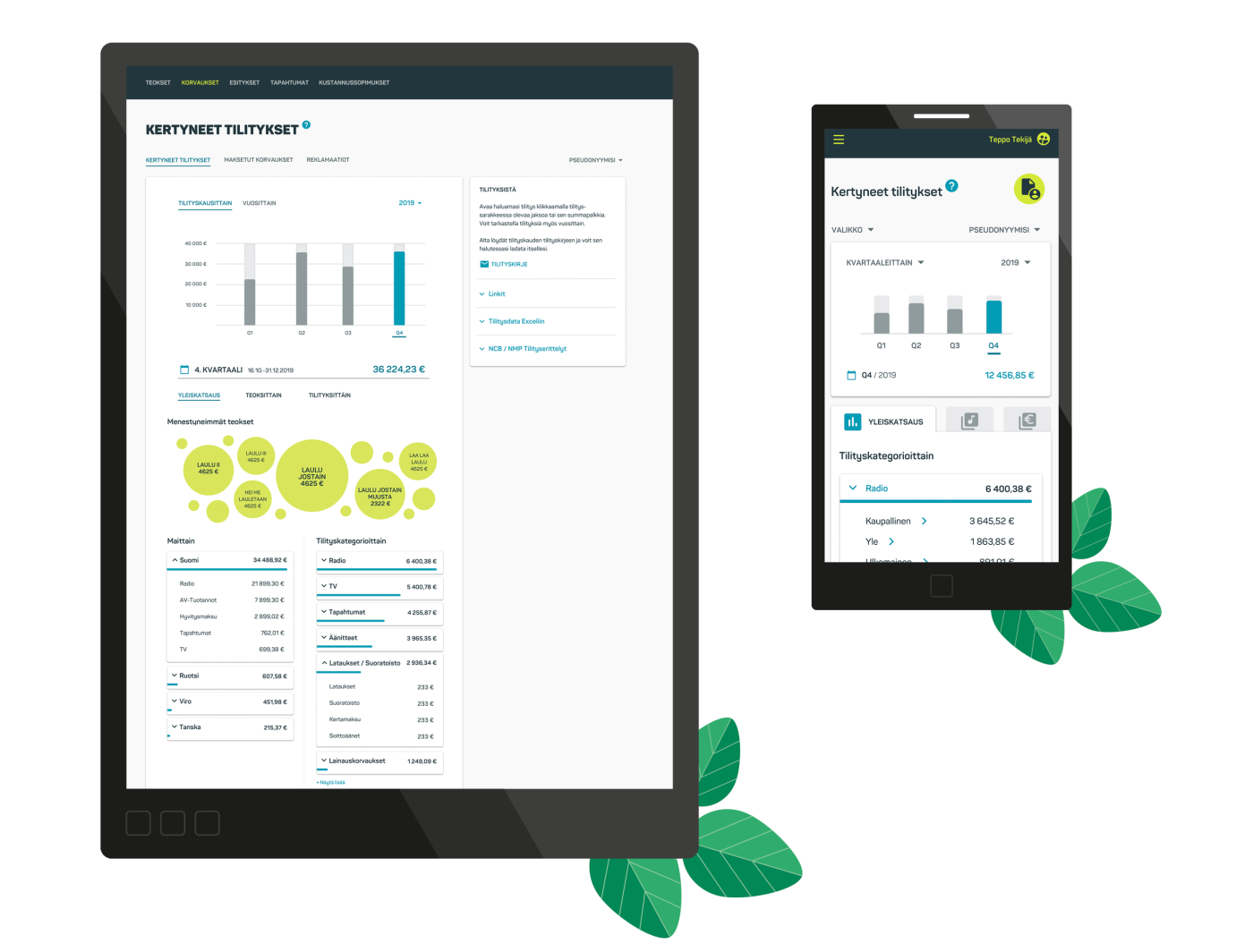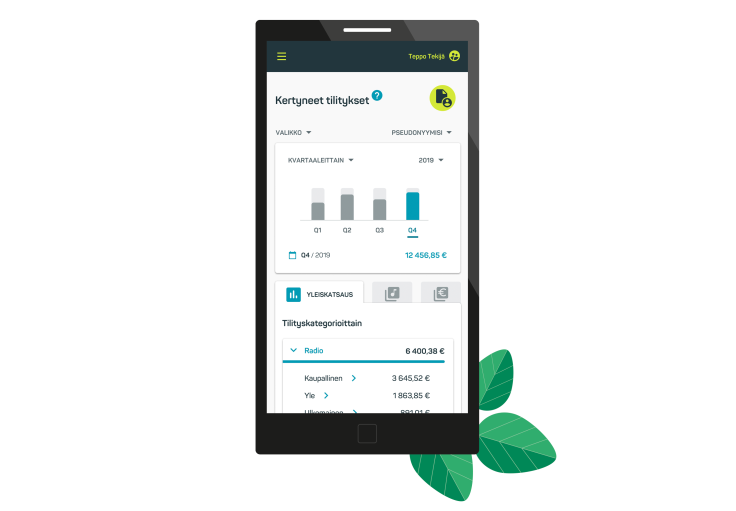In 2017, The Finnish Composers’ Copyright Society Teosto (hereinafter Teosto) decided to renew all its main digital channels. The current situation was recognized as unsustainable in many ways. Technological renewal and certain changes in operational practices were necessary to carry out. The most urgent renewal needs focused on online services provided to customers and stakeholders.
North Patrol is a consulting firm specialized in the design of digital services and information systems. We shape ideas into a vision and service concept, find the best architectural and technological solutions, design a functional user experience, and compete to find the ideal partner for implementation work. We do not sell implementation projects, nor do we sell licenses; we are genuinely on the side of the customer.

Teosto’s online services can be characterized as unique when viewed from Finnish perspective. Copyright royalties for music authors and other music rights holders are settled through these services. Diverse access control and authorization related requirements add complexity to the system.
It was clear from the very beginning, that the online services could not be renewed based on a ready-made platform. It was also clear, that the renewal could not be pulled-off as “one big bang”. Publishing of renewed services in controlled phases was, and is, an absolute necessity. Hence, the new and the old online services must co-exist during the transitional period.
We discussed about the renewal project and future plans with Kirsti Kilponen who is a responsible Program Director at Teosto.
Prerequisite was to ensure the continuity of own operations
Teosto is a Finnish non-profit organization that administers and protects the rights of musicians. These composers, lyricists and arrangers, and their representatives as e.g. music publishers or musician’s own heirs, are Teosto’s customers. From online services point of view, the owners of the musical works’ rights should keep the information regarding these works as up to date as possible. This makes appropriate compensation to be paid for the use of the works possible.
Another important customer group is music users. These include e.g. restaurants and event organizers, who require appropriate permits in order to use music in their operations. The music performers are also an important stakeholder for Teosto. These performers make performance notifications about the songs they perform, even though they aren’t legally bound to do so.
Teosto’s clientele was very dissatisfied with outdated online services. The aim of the renewal was to pay more attention to a high-quality customer experience. At the same time, the aim was to increase the level of self-service among customers, which required improving the mobile usability of the services.

Before Teosto could provide new and customer-friendly online services, there were a few basics that needed fixing. The actual technical solution required modernization and more flexible conditions for development needed to be created. Nevertheless, the most important thing was to tackle the continuity risks that were identified in the current situation. “We had a huge debt burden in terms of documentation which was incomplete or not available at all. In practice, all details were stored as tacit knowledge inside people’s heads.” recalls Kilponen and emphasizes that similar dependence on individuals may no longer emerge.
The renewal of online services had been prepared for a long time. Several objectives related to business development had been identified and numerous renewal plans had been produced. However, Teosto had not been able to progress in practice. Pressure to make concrete actions, both in terms of renewal and the development of own policies, began to grow.
In order to enable the next steps, Teosto ordered expert support from consulting company North Patrol who audited the existing preliminary study of the renewal, prepared a development roadmap and assisted in making suitable technology choices. The cooperation project clarified and supplemented the initial plans and provided the missing ingredients for practical proceeding.
Careful preparation laid a solid foundation for the renewal
Cooperation with North Patrol continued with refining specifications and procurement process. Teosto’s core project group felt that the specification work, especially describing the subject of the procurement (new online services), was rather laborious, but afterwards it has been understood how important the structuring and high-quality documentation of the complex solution was. “The investment we made at the beginning has certainly been worth every penny. It was extremely important that the subject of the procurement was described and defined properly.” praises Kilponen and tells that she’s returned to the documentation numerous times during the renewal project.
Once the specifications were completed, Teosto initiated two different procurements for finding the most suitable technical partners. The first request for proposal sought expert resources to support Teosto’s IT organization in planning and implementing the integration and background services required by the system. The second RFP, launched shortly after publishing of the first one, sought a comprehensive project supplier for designing and implementing the web applications required by the new online services. In addition to these, Teosto acquired a separate partner for testing and quality assurance later. A separate RFP for the renewal of the Teosto.fi website was also published later.
When received proposals were evaluated, Teosto selected the most potential implementation partners for face-to-face meetings to present their offers. “It is absolutely essential that when the supplier presents their offer, they also present their core team members, so we as a customer can ask questions from them”, says Kilponen and continues to instruct the suppliers: “Everyone in the supplier’s team should be well aware about the contents of the RFP and the proposal. They should know in advance what’s coming: what is expected from them, what will they do in practice and how long the project will take.” When we’re at it, Kilponen gives another tip to the suppliers: “Find out in advance who are attending to the presentation session and what roles do these people represent. This will allow you to target your presentation more relevantly to the audience.”
After careful considerations, Teosto decided to select only one partner for both needs: planning and implementation of the integration and background services, and designing and implementation of the web applications. Siili Solutions, who convinced Teosto especially with their technical and integration capabilities, took the overall responsibility of Teosto’s online services renewal project. The partner selection has proved to be successful and the supplier, who was originally chosen as a technology partner, has surprised Teosto positively with its strong service design expertise.
Check out implementation partner Siili’s case story about Teosto including a video where Kirsti Kilponen and Teosto’s Chief Customer Officer Jani Jalonen have been interviewed.
Policies and methods evolve along the way
The technical implementation has been done by replacing piece by piece the old online services with a new solution. The work has been done mainly by a web development team that involves several actors. Besides Teosto’s and Siili’s personnel, the web development team includes members from Vala Group, who is the responsible party for quality assurance, and Biit who is the supplier of Teosto’s CRM system. In addition, a third party has been conducted security audits along the way. The renewal project is also supported by Teosto’s own IT development team.
It was recognized early that there is no ready-made platform that could match Teosto’s requirements. An example of the complexity of the online services is the following scenario, which must be met both technically and from the customer experience point of view:
- One song has three composers, one lyricist and two arrangers who are all entitled to copyright royalties for performances of the song.
- Two out of three composers are also the arrangers of the song.
- Other one of these composer-arrangers is dead, and his rights for the song are administered by an estate of four persons, one of whom has actual administration rights and the others read-only rights to the service.
- Other two composers of the song are alive. One of them manages independently his rights and the other, as a customer of Teosto, has given his administrative rights to Teosto.
- The lyricist of the song, in turn, has an agreement with a publisher who manages his share of the song.
There are several real scenarios like this fictional example and during the transition period these need to be managed in a controlled manner in two different environments.
Technically, the new online services are largely customized implementation that are complemented by selected ready-made products like Contenful. The online services are built on top of services provided by AWS (Amazon Web Services). The user interfaces are implemented by using Vue.js framework and the main technology for background services is Java. The key back-end systems include e.g. Salesforce CRM and IBM Db2. The solution is not actually a micro-service architecture, but rather the applications are packaged into slightly larger entities. This brings certain control to the development of the online services.
Operational methods and practices have been developed along the way to better serve the purpose. The development model that was chosen originally proved to be a little “too agile”. The model led to writing same user stories several times and re-coding of same functionalities many times. This was inefficient and unnecessarily expensive, causing frustration on many levels.
Because of this, Teosto decided to reduce the amount of agility deliberately and bring more waterfall-type-of approach to the everyday work. Now the design is taken further to the agreed checkpoint before coding is started at all. Involving customers in design work is important and, for example, customer interviews are conducted regularly. The aim is to use prototyping in iterations as far as possible. The model has proven to be successful and developers have also liked the new approach.
Another area that has developed significantly along the way is quality assurance, which includes the various stages of testing. Especially automated testing with continuous integration and delivery a has reached a very good level. “While some may find our quality assurance process a little cumbersome, I personally find it very good. There have been very few bugs in production environment.” says Kilponen and continues: “We must always consider the co-existence of two environments and test everything in both the new and the old setup.” In addition, special attention has been paid to the documentation in order to avoid a continuity risk that existed in the initial situation. The continuous collection and monitoring of customer feedback is also a natural part of the process. Based on the feedback, corrective actions will be taken if necessary.
At the beginning of the project, it took a while to form a suitable and effective way for co-operation. Learning occurred at both sides. The release schedule for the originally planned pilot was delayed many times. When the parties overcame the initial difficulties and the operating models became clear, working has stabilized at a good level. “Since the first release, we have been able to release new services every three months on average. I think this is a very good pace for us.” smiles Kilponen with satisfaction.
Regarding the fluency at the beginning of the project, Kilponen would do at least one thing differently in the light of current knowledge. “We started the project without a product owner, whose existence would have made the working much more efficient” she sighs and continues: “The buying customer needs to find a person who understands the business and is fully resourced to the project. This person must have the ability to tackle different opinions and to identify what is reasonable.”
Trust is built on human encounters
Kilponen emphasizes the importance of human factors and soft values as prerequisites for a successful co-operation: “After all, people do these things. Of course, everyone has their own responsibilities, but it’s the team’s joint effort that makes the difference. It is really important that people get along with each other and work together smoothly.”
According to Kilponen, the most important thing is trust: “Building trust with the supplier starts already at the bidding stage. Along the way, it will expand and emerge gradually to a genuine partnership that benefits both parties. This requires that both are flexible when needed on the way to reach a common goal.”
Trust enables resolving also more difficult situations that will inevitably arise. “It is naive to imagine that in such a big project there would be no failures or unexpected situations. What matters is how to cope with them.” says Kilponen basing her thoughts on long experience.
In case of Teosto, in addition to technical challenges or e.g. project personnel changes, unexpected things may also arise through a changing operating environment. One such example is the decision made by the Finnish Competition and Consumer Authority in December 2018, which allowed Teosto’s customers to self-manage their rights to the works they owned more extensively. Such authority guidelines are preconditions for Teosto’s operations and these kinds of decisions require quick responding. Naturally, these decisions have also an effect on the operational logic of the online services and, with it, on the prioritization of the development backlog. “In the future, we will be even closer to our customers. We do not want to force them to adapt to our processes, but rather we must be able to bend to their real needs.” Kilponen opens Teosto’s strategy and the importance of the online services.
The online service renewal project should be fully completed by the end of 2021. There is still a lot of work to be done and difficult things will certainly come up in the future as well. “Together, we will solve the challenges and decide what actions to take. Accusing others leads to nothing.” Kilponen reasons, concluding the interview with an old wisdom: “You learn the most from failures.”
Project information
Teosto’s online services
Key technologies: Amazon Web Services (AWS), Java, Vue.js, Contentful
Total price category of the project: > 1 000 000 €
Key stages of the project:
- December 2017 – February 2018: Auditing the existing preliminary study, preparing a development roadmap and supporting technology selections (North Patrol)
- February – June 2018: Refining specifications and procurement process (North Patrol)
- From June 2018 on: Planning and implementing the online services and related integrations, service design (Siili)
- February 2019: Launch of the first new online service application: Submitting a new work notification
From spring 2019 on, Teosto has been able to release new services every three months on average. The aim is to replace old online services completely with new ones by the end of 2021.
Read the original article (in Finnish):


